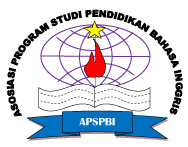THE USE WHOLE LANGUAGE APPROACH ON YOUNG LEARNERS VOCABULARY ENRICHMENT
Abstract
Vocabulary is an English basic need that is required in the learning process. Through vocabulary, people can express their ideas. In fact, the students still get some difficulties when they learn vocabulary, especially for young learners. Young learners are supposed to be the children who study at the first year of formal schooling. They are kindergarten students in 4 years old and elementary students who are 6-12 years old. This research is conducted at SDIT Bening to find out the effect of using whole language approach on young learners vocabulary enrichment. In this research, pre-experimental method with one group pre-test post-test is used. 22 students are taken as the sample. Some statistical calculations are done to analyze the data and t-test formula is applied to get the final result. Based on the data calculation, the t-test value is 3.22. The result of t-calculated and t-table with d.f = 21 at significant level 0.01 is 2.83 and significant level of 0.05 is 2.08. It shows that the value of t-calculated is higher than t-table (3.22more than 2.83 more than 2.08). It means that the alternative hypothesis (Ha) is accepted. Therefore, it can be concluded that there is an effect of using whole language approach on young learners vocabulary enrichment.
Keywords: whole language approach, young learners, vocabulary enrichment.
References
Brown, Dale. 2008. Using a modified version of the Vocabulary Knowledge Scale to aid vocabulary development. Japan: JALT Publication.
Froese, Vector. 1991. Whole Language Practice and Theory. Boston: Allyn and Bacon.
Linse, Caroline T. 2005. Practical English Language Teaching: Young Learners. Singapore: McGraw-Hill.
Sugiyono. 2015. Metode Penelitian Pendidikan: Pendekatan Kuantitatif, Kualitatif, dan R&D. Bandung: Alfabeta.
Supardi. 2013. Aplikasi Statistika Dalam Penelitian; Konsep Statistika yang lebih Komprehensif. Jakarta: Smart.
DOI: 10.55215/jetli.v1i1.1491
 Abstract views : 612
Abstract views : 612
Refbacks
- There are currently no refbacks.
Copyright (c) 2019 JETLi | Journal of English Language Teaching and Linguistics Studies



